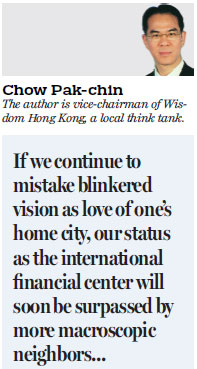You snooze, you lose: HK must shed provincialism
Updated: 2017-03-24 09:28
By Chow Pak-chin(HK Edition)
|
|||||||
Chow Pak-chin laments the closed-mindedness many people in the city show, and warns against sinking to tourist-trap status, as happened to Yangzhou and Venice
If quizzed on a detailed account of the annual report Premier Li Keqiang made to the National People's Congress in Beijing this month, many Hong Kong people are likely to answer with a blank stare. That such a significant event - involving not just Hong Kong and the Chinese mainland but a reshuffle of world power - would elude Hong Kong people is lamentable but nonetheless understandable; understandable because many local media outlets aren't doing their job to relay what ought to be a top news story for the city. It isn't just the local media outlets that aren't doing their job but key opinion leaders and Legislative Council members as well - people who have the responsibility to not just opine on, but to inform the population at large on affairs that influence the city's future development.
For a start, Li highlighted the role China would continue to play in the changing global political and social landscape. China would be on the side of stability and peace, taking up roles as facilitator of world peace, contributor to world development and defender of world order. In essence, it is not China's desire to adopt a hegemonic approach regardless of its rise in power, both politically and economically.
Responding to a Thai reporter's question on the dilemma "the power struggle between China and the United States in the region" puts Southeastern Asian countries in, Li said: "We don't want to see (Association of Southeast Asian Nations) countries having to take sides, just like what happened during the Cold War mentality." Li was really emphasizing China's neutrality in regional conflicts. Instead of asserting superiority, China will be - and in fact, has been - initiating collaboration with neighboring countries in the region, for economic growth not only for itself but also for its neighboring countries, not least through initiatives such as the Belt and Road.

Outlining China's plan to create a city cluster in the Guangdong-Hong Kong-Macao Greater Bay Area, Li hinted at the important role Hong Kong will play in facilitating such a plan. This is in line with NPC Standing Committee Chairman Zhang Dejiang's statement on the exclusive privilege the central government granted to Hong Kong. At a time when the world is making a beeline for a piece of the colossal and ever-growing Chinese market, which Zhang likened to an express train, Hong Kong already has a seat, the need to buy a ticket waived, regardless of its relatively low contribution to the country's GDP.
Yet despite all these pointers to a better economic future for Hong Kong the city chooses to rest on its laurels, letting memories of past glory and achievements eclipse common sense and logical thinking, preferring to let antagonistic political sentiments brew instead. Let's have our mind refreshed about the story of Yangzhou - this isn't some random history lesson, I promise. Once one of the wealthiest cities in China and possibly the entire world, Yangzhou - now a prefectural-level city in central Jiangsu province - was made southern capital of China under Emperor Yang of Sui (reign 604-618 AD). With the completion of the Grand Canal at the end of the dynasty, Yangzhou experienced a rise in trade and prosperity from the Tang (618-907) to Qing (1644-1911) dynasties, when the Grand Canal served as an important economic belt. Naturally, you would assume the prosperity in Yangzhou would last, with such a strong historical foundation, but no. Economic development in Yangzhou nosedived when railways replaced nautical transport. A railway system would have benefited the already thriving city but construction was continually stalled by resistance from the inhabitants, who voiced worries over environmental and noise pollution. Yangzhou was finally connected by passenger rail in 2004, and the Grand Canal was designated a UNESCO World Heritage Site a decade later, but Yangzhou will forever be remembered as the once-wealthy city that had seen better days.
A similar lesson was learnt by Venice, once the major financial and maritime power during the Middle Ages and Renaissance. As a significant center of commerce and art in the 13th century, Venice was considered to be the first real international financial center, peaking in its wealth and development in the 14th century. Yet when Portugal took over as Europe's principal trading intermediary with the East, while France and Spain fought for hegemony over Italy, Venice's political influence was marginalized and it entered a tragic decline. Now it has a superficial status as tourist hotspot. Allow me one more study case before I reach my final point. On a narrow stretch of water between the Malay Peninsula and Sumatra, Malacca took advantage of its location on the main shipping channel between the Indian Ocean and the Pacific Ocean, and built immense wealth taxing passing vessels to and from major Asian economies such as China, Japan and India. But all that came to a halt when Singapore offered itself as a tax-free port.
What all these once-exalted cities with unparalleled economic development teach us is that complacency and narrow-mindedness will only contribute to one's demise. If all we ever care about is local affairs, if we continue to mistake blinkered vision as love of one's home city, our status as the international financial center will soon be surpassed by more macroscopic neighbors, and the last laugh certainly won't be ours.
(HK Edition 03/24/2017 page1)